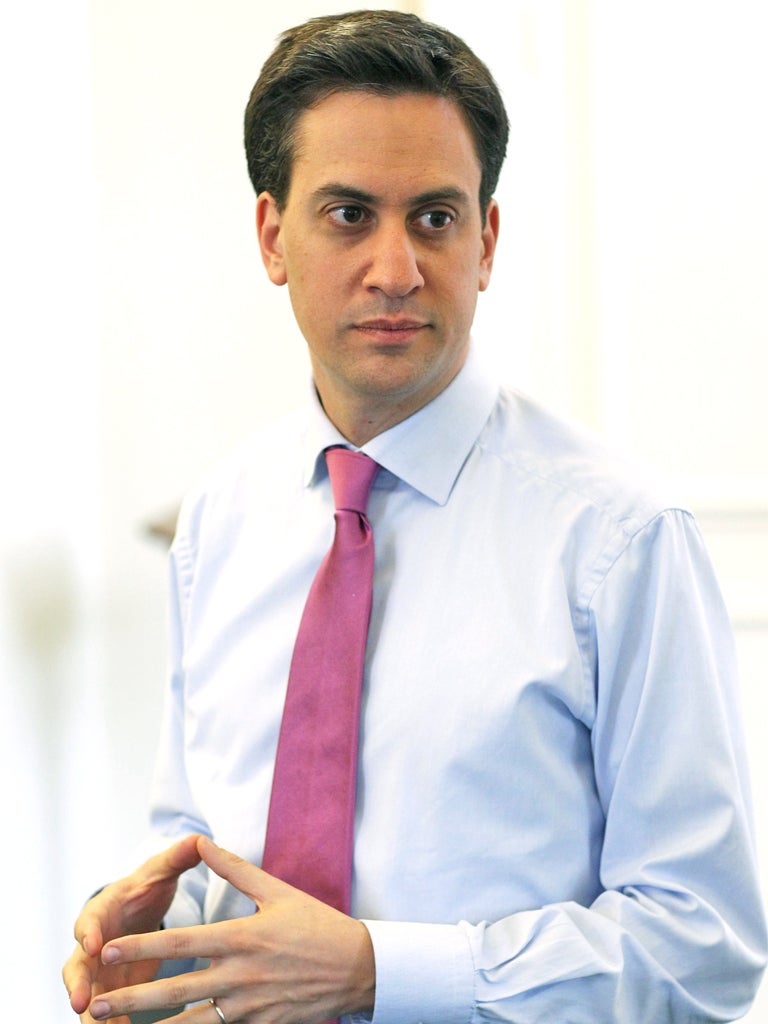Miliband vows to back public sector cuts – even if union backers withdraw their cash
Labour leader adopts high-risk strategy in bid to regain credibility on the economy

Your support helps us to tell the story
From reproductive rights to climate change to Big Tech, The Independent is on the ground when the story is developing. Whether it's investigating the financials of Elon Musk's pro-Trump PAC or producing our latest documentary, 'The A Word', which shines a light on the American women fighting for reproductive rights, we know how important it is to parse out the facts from the messaging.
At such a critical moment in US history, we need reporters on the ground. Your donation allows us to keep sending journalists to speak to both sides of the story.
The Independent is trusted by Americans across the entire political spectrum. And unlike many other quality news outlets, we choose not to lock Americans out of our reporting and analysis with paywalls. We believe quality journalism should be available to everyone, paid for by those who can afford it.
Your support makes all the difference.Ed Miliband warned trade unions last night that he would not back down over Labour's tougher commitment to spending cuts despite their threats to cut their funding to the party.
Mr Miliband faced the biggest challenge to his authority since becoming party leader as union heads vented their anger over Labour's call for the Coalition's public-sector pay constraint to be extended to protect jobs.
The GMB joined Unite in accusing the Labour leadership of embracing the Coalition's cuts after Labour confirmed it could not promise to reverse all of them if it wins power. Paul Kenny, the GMB leader, said Labour's new stance could have a "profound impact" on its relationship with the union.
In a letter to senior GMB officials, he said: "It is now time for careful consideration and thought before the wider discussions begin on the long-term implications this new stance by the party has on GMB affiliation."
Although Labour relies on the unions for about half its total income and more than 80 per cent of its donations, Mr Miliband hit back by vowing that he would not bow to threats.
"I am not going to change my policy in the face of threats," he said. "I am going to do the right thing. Of course there are going to be some people in the party who don't like it but I'm afraid that's tough. We need to do the right thing, the responsible thing."
In a series of broadcast interviews, Mr Miliband defended Labour's refusal to pledge to reverse the Government's cuts. "I'm not going to make promises that I cannot keep," he said. "That's the first rule of any responsible Opposition."
He went further by urging unions to negotiate pay-restraint deals with employers to limit job cuts. "Let's do it in a fair way, but let's preserve jobs and services," he said. "I think most people will think it is the right choice.
"We can still deliver fairness even in these tough times. We can make different decisions and choices that help working people. My priority must be to show that Labour can be trusted with the nation's finances."
The dispute flared up after Len McCluskey, Unite's general secretary, suggested that Labour's support for a pay freeze would mean "certain election defeat" and could even put Mr Miliband's survival as leader at risk.
His allies hope his tough response last night will entrench his position. It should reassure Blairites who backed his older brother David for the leadership in 2010. They have been demanding more clarity over Labour's support for cuts to answer the Tory charge that the party is "in denial" over the deficit.
Labour has struggled to balance its short-term response to the lack of growth with a longer-term message about what it would do if it regains power to help the party regain economic credibility with the public.
John Mann, MP for Bassetlaw, said: "We are not going to be able to compete with China or India by cutting the living standards of our dinner ladies, cleaners and other low-paid public sector workers."
Mr Miliband received support from Alan Johnson, the former Labour Home Secretary and union general secretary, who said the trade union movement was at risk of plunging back to the "fantasy utopias" of the 1970s.
Mr Miliband tried to position himself as the "consumer's champion" by calling for restrictions to station car parking charges, "hidden" fees in airline ticket prices and the cost of phoning consumer helplines.
Now available for children's parties...
As if trying to achieve peace in the Middle East were not enough to be getting on with, Tony Blair has now taken up the challenge of teaching English to Thai children.
On a visit to Bangkok this week (capital of the self-styled 'Land of Smiles'), the beaming former PM spoke to a class of children and asked them to repeat phrases back to him.
The trip was part of his Faith Foundation programme, backing a scheme in which Thai children must spend at least one day a week speaking solely in English.
Join our commenting forum
Join thought-provoking conversations, follow other Independent readers and see their replies
Comments